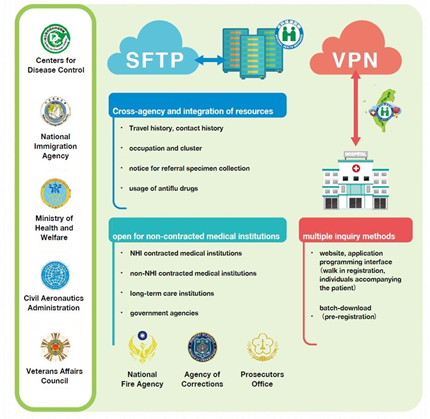During the COVID-19 pandemic in 2020, Taiwan's effort in containing the pandemic has again gained international recognition. The BMJ, a leading journal dedicated to medical research, published a column "What we can learn from Taiwan's response to the COVID-19 epidemic" on July 21, 2020, and introduced two forms of information technologies that are critical in its pandemic preparedness and control. The first is the NHI Smart Card that allows all providers real-time access to upload patient records and claims. The other is the NHI MediCloud system, which provides providers and patients with real-time access to patient's health records, including diagnostic imaging and prescriptions. The article introduces how Taiwan's information technology, strong public health infrastructure and forward-looking plans have their crucial roles in effectively controlling the COVID-19 pandemic in Taiwan.
The NHI database and cloud system constructed over the years have been proven as effective tools to tackle pandemic. Medical institutions are linked through the cloud system to exchange any information necessary during this period of time, and all relevant measure comply with Communicable Disease Control Act and Special Act for Prevention, Relief and Revitalization Measures for Severe Pneumonia with Novel Pathogens. The ultimate goal is maximizing public health benefits while minimizing intrusion of privacy.
Case sharing: NHI MediCloud System- using cloud system and technology to tackle the COVID-19 pandemic
Since the outbreak of COVID-19 in the beginning of 2020, NHIA cooperated with the Center Epidemic Command Center (CECC) and made use of NHI MediCloud System, which have already been widely used in medical institutions. With the NHI card and MediCloud, medical institutions can quickly access to individual’s travel history to Wuhan area and listed contacts with confirmed cases, and medical institutions can thus be aware of patients’ condition.
Later, MediCloud further included individual's travel history of every countries, occupation, cluster, notice of referral for specimen collection and testing and prescriptions of anti-flu drugs in the past 10 days. Meanwhile, with cross-agency and integration of resources from Ministry of Health and Welfare, Ministry of the Interior National Immigration Agency, Civil Aeronautics Administration, Ministry of Transportation and Communication and Veterans Affairs Council, the medical institutions (including NHI contracted and non-contracted medical institutions), long-term care institutions, National Fire Agency, Ministry of the Interior, Agency of Corrections, Ministry of Justice and local prosecutors offices) can use online services (with/without the NHI card), batch-download or application programming interface to get access to individual's TOCC (Travel history, Occupation, Contact history, Cluster). The efforts are aimed at reducing the spread of COVID-19 within the hospital and community, lessening the pressure and risk of infection for medical staff and professional practitioners, monitoring the development of pandemic and containing the COVID-19 pandemic.

Chart: Integration of resources to safeguard people's health
(From February 2020 to June 2021, the number of TOCC inquiry has reached up to 937 million times.)
Case sharing: AI technologies equip NHI with capacity for containing the COVID-19 pandemic
To help containing the COVID-19 pandemic, the NHIA utilizes big data with AI technologies and works in collaboration with National Cheng Kung University Hospital to develop MedCheX, an image-based chest x-ray pneumonia detection platform for COVID-19. By this AI model, the physician is able to quickly identify x-ray images and offer value-at-risk of COVID-19, which effectively increases the capacity of x-ray images identification, alerts medical staff and helps medical triaging, which reduce the risk of infection and effectively contain the COVID -19 pandemic.
Due to uneven distribution of medical resources, it might take long time to receive testing results in areas that are short of medical resources and radiologists. MedCheX built in VPN makes it unnecessary for medical institutions to make additional purchase of AI equipment. Through uploading x-ray images, information such as the value-at-risk of COVID-19 identified by AI model as well as the image that marks that position of the lesion can be received within a minute.
Case sharing: Telemedicine under coverage that offers medical services for individuals under quarantine and self-health monitoring
In response to the COVID-19 pandemic, if there is urgent medical need for individuals who are under quarantine or self-health monitoring but do not have fever or symptoms of respiratory tract infection, individuals shall contact department of public health and receive medical service accordingly. After the confirmation of medical need, individuals will then be transferred to designated medical institutions for telemedicine. For special conditions such as telemedicine being unavailable in remote places, phone consultations are available. In response to the severe COVID-19 pandemic, CECC announces that starting from May 15, 2021, the medical service includes outpatient services, while patients with chronic disease yet stable condition can choose phone consultations. Furthermore, to protect individual’s privacy, physicians shall conduct telemedicine in the medical institution. Telemedicine services covered by the NHI are also included in the NHI coverage.
Case sharing: Name-based mask distribution system
The NHI card effectively helps the name-based mask distribution system distribute masks. The purchase can be done by“1.0 physical access" at pharmacy and public health center, also by“2.0 internet access”that enables individuals to log in to eMask purchase system with the NHI card or Citizen Digital Certificate, or with the authentication of identification by NHI APP.“3.0 pre-order at convenience stores”enables individuals to pre-order masks simply by inserting the NHI card in the kiosk. The NHI card plays a significant role in the name-based mask distribution system, helping the Centers for Disease Control and Food and Drug Administration with fair distribution of supplies.

